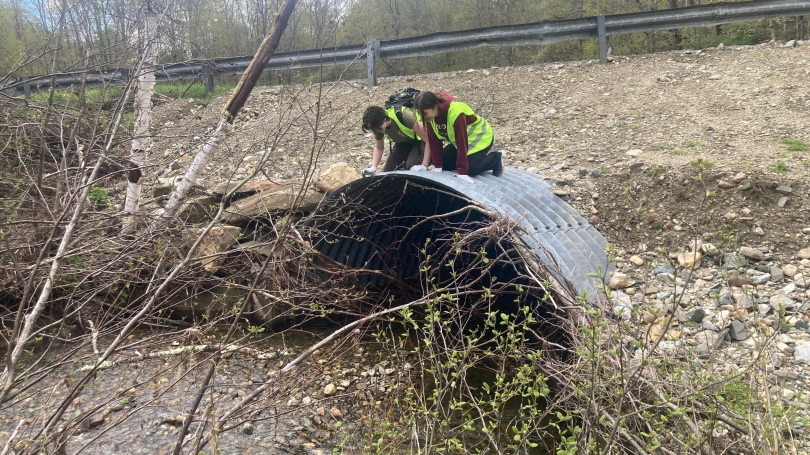

The Rural Rivers Project explores how social, technical, and ecological factors converge to impact flooding disasters in Vermont's inland river systems.
After Vermont was hit by catastrophic flooding in July 2023, an interdisciplinary team of Dartmouth researchers joined forces to study flood disaster response and recovery.
The Rural Rivers Project explores how social, technical, and ecological factors converge to impact flooding disasters in Vermont's inland river systems. The research initiative recently received a three-year National Science Foundation Senior Cultural Anthropology Award, with additional support from the NSF's Established Program to Stimulate Competitive Research. The new funding will allow the team to expand their scope from the Black River Valley towns of Cavendish and Ludlow to include the White River valley.
Charis Boke, a lecturer and research associate in the Department of Anthropology, co-leads the project alongside Sarah Kelly, a lecturer and research associate in the Department of Geography and research scientist at the Energy Justice Clinic of the Irving Institute for Energy and Society, and GIS specialist Aletha Spang. The initiative is also supported by faculty in Earth sciences and engineering, collaborators at the Colorado School of Mines, and Vermont's Black River and White River Valley communities.
Through ethnographic interviews and geographical assessments, the researchers are learning about community priorities, attitudes, and infrastructural needs. They're also investigating how communication issues between communities, mutual aid networks, and state and federal stakeholders might negatively impact disaster response and recovery.
"We're committed to using research projects to both create new knowledge and develop meaningful partnerships that support community-driven efforts," Boke says. "I'm really interested in learning about people's stories and the texture of life as a way to gain new insight into what has happened and what is possible. Through community meetings and interviews, we generate an intimate understanding of what people are encountering day to day, in the moment of flood disaster, during the long recovery process, and in thinking about how to mitigate future disasters."

As part of their initial mapping work, the researchers worked with community partners and students in Dartmouth's Energy Justice Clinic to survey local water infrastructure such as culverts. These initial surveys will inform the development of a phone app that enables community members to take photos and enter GPS data on local water bodies and infrastructure. These maps will help the community gauge the health of their waterways and infrastructure, which can then guide repairs to prevent future issues.
"Culverts and drains are often the first infrastructure to break or get clogged during floods, which can then have a domino effect by knocking out bridges, roads, or houses downstream," says Kelly. "I think there's potential for an open source app like this to have a broader impact and use in the future."
"A number of Vermont towns are in these difficult decisions about what to repair and what to relocate, which is a very intense decision to have to make about things that are part of their town identities and their cultural and physical landscapes," Boke says.
Like most research at Dartmouth, the project is fueled by student engagement, both through class community outreach work and paid research assistantships. In particular, the researchers say that students have been instrumental in leading the culvert mapping initiative.
"It's been really meaningful to see our project resonate with students, and to see students take leadership and find a community in this work," says Spang. "I'm looking forward to building this into a bigger research project over the next three years that reaches more communities and involves even more students."
"I love the interdisciplinarity of our team, both at the level of anthropologist, geographer, and GIS expert, but also our students, who include studio art majors, earth sciences majors, anthropology majors, and geography majors, many of whom bring knowledge from lived experience," says Kelly.
As climate change increases the frequency and severity of national disasters, the Rural Rivers Project adds to growing research at Dartmouth that studies flooding from multiple angles, including how climate change might increase precipitation in the northeast, and the impact of extreme floods on soil erosion.